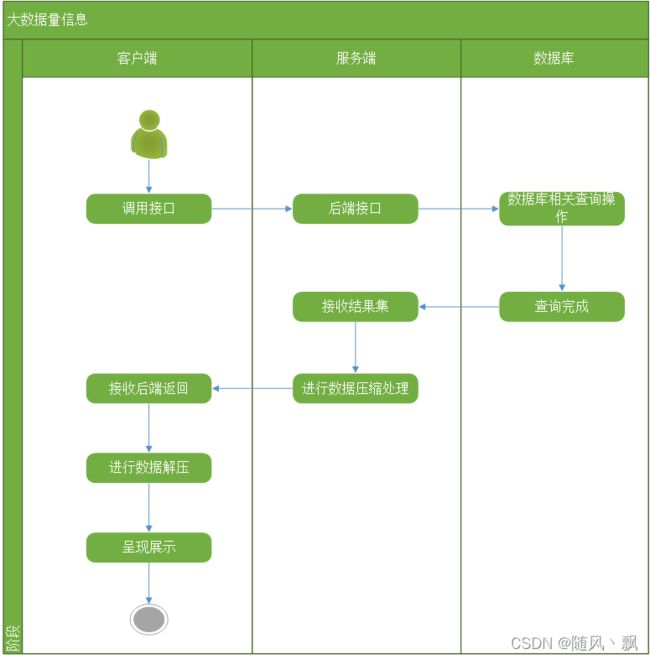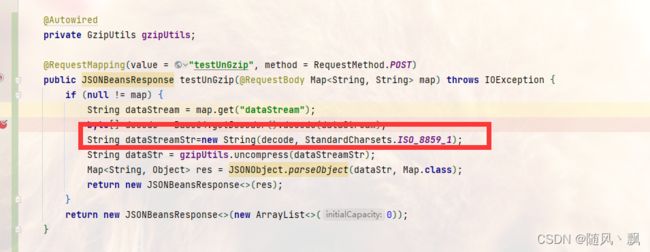spring boot 集成gzip和zip数据压缩传输(适用大数据信息传输)
1、背景
在查询数据库信息的时候,由于数据库信息返回数据条数较多,数据从服务器端传至客户端耗费大量时间,导致查询数据变慢。
2、方案思路
1)、从查询sql上入手,进行sql优化;
2)、从业务层面优化,复杂接口拆分成多个接口,避免大量数据堆积返回(视业务需求而定);
3)、对返回的大数据信息进行数据压缩。(本文要点)
3、压缩数据方案
1)、gzip压缩
2)、zip压缩
4、具体实现
(1)、gzip压缩方案
GzipUtils工具类
package com.自己的包.util;
import org.springframework.stereotype.Component;
import java.io.ByteArrayInputStream;
import java.io.ByteArrayOutputStream;
import java.io.IOException;
import java.nio.charset.StandardCharsets;
import java.util.zip.GZIPInputStream;
import java.util.zip.GZIPOutputStream;
/**
* @program: tool_java
* @description:
* @author: sfp
* @create: 2021-11-30 14:33
**/
@Component
public class GzipUtils {
/**
* 压缩
*
* @param data 数据流
* @return 压缩数据流
* @throws IOException 异常
*/
public byte[] compress(byte[] data) throws IOException {
if (data == null || data.length == 0) {
return null;
}
ByteArrayOutputStream out = new ByteArrayOutputStream();
GZIPOutputStream gzip = new GZIPOutputStream(out);
gzip.write(data);
gzip.close();
return out.toByteArray();
}
/**
* 压缩
*
* @param str 需要压缩数据信息
* @return 压缩数据流
* @throws IOException 异常
*/
public byte[] compress(String str) throws IOException {
if (str == null || str.length() == 0) {
return null;
}
return compress(str.getBytes(StandardCharsets.UTF_8));
}
/**
* 解压
*
* @param data 欲解压数据流
* @return 原数据流
* @throws IOException 异常
*/
public byte[] uncompress(byte[] data) throws IOException {
if (data == null || data.length == 0) {
return data;
}
ByteArrayOutputStream out = new ByteArrayOutputStream();
ByteArrayInputStream in = new ByteArrayInputStream(data);
GZIPInputStream gunzip = new GZIPInputStream(in);
byte[] buffer = new byte[1024];
int n;
while ((n = gunzip.read(buffer)) >= 0) {
out.write(buffer, 0, n);
}
gunzip.close();
in.close();
return out.toByteArray();
}
/**
* 解压
*
* @param str 欲解压数据字符串
* @return 原数据
* @throws IOException 异常
*/
public String uncompress(String str) throws IOException {
if (str == null || str.length() == 0) {
return str;
}
byte[] data = uncompress(str.getBytes(StandardCharsets.ISO_8859_1));
return new String(data);
}
}
数据压缩
@Autowired
private GzipUtils gzipUtils;
@RequestMapping(value = "testGzip", method = RequestMethod.POST)
public JSONBeansResponse testGzip(@RequestBody Map map) throws IOException {
if (null != map) {
String sqlStr = map.get("paramStr");
// 调用数据库获取数据
Map resMap = testMapper.findInfo(sqlStr);
String dataStr = JSONObject.toJSONString(resMap);
// 开始压缩数据
byte[] compress1 = gzipUtils.compress(dataStr);
String FileBuf = Base64.getEncoder().encodeToString(compress1);
return new JSONBeansResponse<>(FileBuf);
}
return new JSONBeansResponse<>(new ArrayList<>(0));
} 数据解压
@RequestMapping(value = "testUnGzip", method = RequestMethod.POST)
public JSONBeansResponse testUnGzip(@RequestBody Map map) throws IOException {
if (null != map) {
String dataStream = map.get("dataStream ");
byte[] decode = Base64.getDecoder().decode(dataStream);
byte[] compress1 = gzipUtils.uncompress(decode);
String dataStr = new String(compress1);
Map res = JSONObject.parseObject(dataStr, Map.class);
return new JSONBeansResponse<>(res);
}
return new JSONBeansResponse<>(new ArrayList<>(0));
} 遇到问题
解压时候报错:java.util.zip.ZipException: Not in GZIP format
解决方案:在转换为字符串时,一定要使用ISO-8859-1这样的单字节编码
(2)、zip压缩方案
ZipUtils工具类
package com.自己的包.util;
import org.springframework.stereotype.Component;
import java.io.ByteArrayInputStream;
import java.io.ByteArrayOutputStream;
import java.io.IOException;
import java.nio.charset.StandardCharsets;
import java.util.Base64;
import java.util.zip.ZipEntry;
import java.util.zip.ZipInputStream;
import java.util.zip.ZipOutputStream;
/**
* @program: tool_java
* @description: zip压缩工具
* @author: sfp
* @create: 2021-12-01 14:11
**/
@Component
public class ZipUtils {
/** 压缩
* @param data 原数据流
* @return 压缩后的数据流
* @throws IOException 异常
*/
public byte[] compress(byte[] data) throws IOException {
if (data == null || data.length == 0) {
return null;
}
ByteArrayOutputStream out = new ByteArrayOutputStream();
ZipOutputStream gzip = new ZipOutputStream(out);
gzip.putNextEntry(new ZipEntry("json"));
gzip.write(data);
gzip.close();
return out.toByteArray();
}
/** 压缩
* @param str 原数据字符串
* @return 压缩后的数据流
* @throws IOException 异常
*/
public byte[] compress(String str) throws IOException {
if (str == null || str.length() == 0) {
return null;
}
return compress(str.getBytes(StandardCharsets.UTF_8));
}
/** 解压缩
* @param data 压缩后的数据流
* @return 原数据的数据流
* @throws IOException 异常
*/
public byte[] uncompress(byte[] data) throws IOException {
if (data == null || data.length == 0) {
return data;
}
ByteArrayOutputStream out = new ByteArrayOutputStream();
ByteArrayInputStream in = new ByteArrayInputStream(data);
ZipInputStream gunzip = new ZipInputStream(in);
ZipEntry nextEntry = gunzip.getNextEntry();
while (nextEntry != null) {
final String fileName = nextEntry.getName();
if (nextEntry.isDirectory()) {
nextEntry = gunzip.getNextEntry();
} else if (fileName.equals("json")) {
byte[] buffer = new byte[1024];
int n;
while ((n = gunzip.read(buffer)) >= 0) {
out.write(buffer, 0, n);
}
gunzip.close();
in.close();
return out.toByteArray();
}
}
return out.toByteArray();
}
/** 解压
* @param str 压缩后的base64流
* @return 原数据字符串
* @throws IOException 异常
*/
public String uncompress(String str) throws IOException {
if (str == null || str.length() == 0) {
return str;
}
byte[] data = uncompress(Base64.getDecoder().decode(str));
return new String(data);
}
}
zip使用
@Autowired
private ZipUtils zipUtils;
@RequestMapping(value = "testzip", method = RequestMethod.POST)
public JSONBeansResponse testzip(@RequestBody Map map) throws IOException {
String sqlStr = map.get("paramStr");
List> resMap = testMapper.findInfo(sqlStr);;
String dataStr = JSONObject.toJSONString(resMap);
// 开始压缩数据
byte[] compress1 = zipUtils.compress(dataStr);
String FileBuf = Base64.getEncoder().encodeToString(compress1);
// 开始解压数据
String s = zipUtils.uncompress(FileBuf);
List 5、总结
在大数据量的传输中,压缩数据后进行传输可以一定程度的解决速度问题。
zip和gzip的压缩率测试过几次大概在5-6倍大小左右。
6、收工图
![]()

